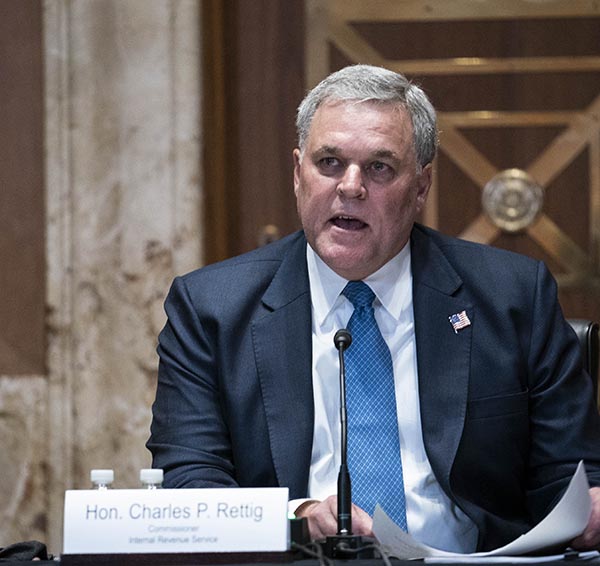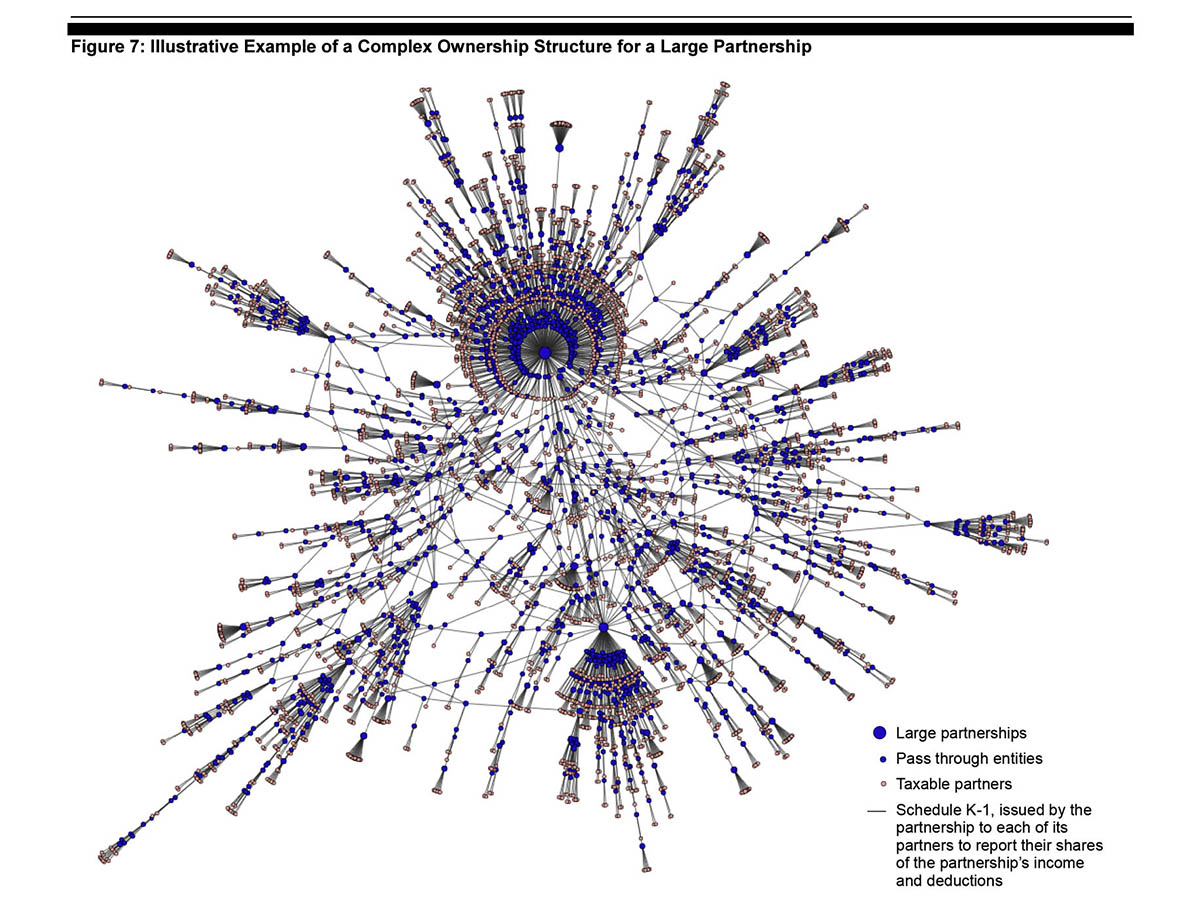Inside the IRS unit taking on America’s millionaires and billionaires
The U.S. Internal Revenue Service is seeking to use an infusion of funding to keep up with the ever-evolving tax maneuvers of the ultra-rich — while staving off frequent political attacks.

A pair of U.S. Internal Revenue Service agents are attempting to interview a billionaire they suspect of cheating on his taxes. But across the table from the agents is a formidable entourage of esteemed tax professionals hired to defend the billionaire. They include white-shoe attorneys — each of whom knows more about their own arcane corner of tax law than just about anyone on earth — along with highly specialized accountants and economists.
Neither of the two IRS agents has a law degree. Complex arguments from the billionaire’s entourage fly over their heads. The IRS agents are outmatched by a team whose combined years of experience in tax law and accounting exceed their own by over a century.
This stark example, laid out by former IRS officials in interviews with the International Consortium of Investigative Journalists, isn’t a hypothetical so much as a glimpse into the agency’s regular challenges in auditing the United States’ highest earners. These battles often come down to experience and expertise. The IRS has been losing, former officials said.
“The really experienced people tend to be on the outside [of the IRS],” Charles Rettig, who ran the IRS under former president Donald Trump and left the agency in 2022, told ICIJ. “That’s a major hurdle.”
A historic push is now underway to change this dynamic. In mid-2022, the Inflation Reduction Act delivered the IRS a historic $80 billion — in part, to bulk up the agency’s divisions that audit millionaires, billionaires and large corporations. After years of pitiful enforcement rates against wealthy taxpayers, the agency is embarking on an unprecedented push to step up its capabilities and hone its ability to take on the ultra-rich.

Hundreds of billions could be at stake. The Treasury Department, the IRS’s parent agency, has estimated that wealthy people do an outsized share of tax dodging. As of 2019, the top 1% of Americans are responsible for 28% of the “tax gap” — defined as the difference between taxes that are owed and collected. This number added up to an estimated $163 billion annually. In early February, the Treasury Department announced that if the increased funding levels remained intact, the IRS could collect more than a half-trillion dollars in additional unpaid taxes over the next decade.
ICIJ investigations, including the Panama Papers and Paradise Papers, revealed the complex maneuvers wealthy people and corporations use to evade or avoid taxes. Over several years of reporting, ProPublica exposed how chronic underfunding had put the IRS at a dire disadvantage, sometimes falling badly behind in complex global tax cases because it could not retain the necessary expertise to match its counterparts in the private sector.
For nearly two years, House Republicans have made it a priority to claw back the IRS’s new money, chipping away more than a quarter of the $80 billion. They have argued that an empowered tax agency will impinge on Americans’ liberties and have claimed, dubiously, that it will increase audits of working-class people. The IRS now finds itself in the difficult position of defending a mission that, due to its complexity and scale, could take years to yield its full impact.
Still, the agency has touted a few early wins spurred by the infusion of funds. It said it opened 1,600 new cases involving millionaires and billionaires last year and has already recouped several hundred million dollars in previously unpaid taxes as a result. This includes $15 million from one individual who claimed huge business deductions on the construction of their 51,000-square-foot mansion, including its pool, pool house, tennis and bocce ball courts, as well as luxury cars, country club memberships and homes for their children.
ICIJ spoke with more than a dozen current and former federal tax officials, as well as experts in the field, who painted a picture of an agency at a pivotal moment as it tries to modernize while coming under frequent political attacks. Equalling the might of the billionaire entourage is a goal that many agree is years away. Now may be its only chance to lay the groundwork.
Strength in expansion
Last September the IRS announced it would hire 3,700 new agents to help increase scrutiny of taxes paid by corporations, wealthy people and the private investment funds they increasingly favor. It’s an ambitious goal, as the agency must compete with corporate law firms and accountancies that offer tax professionals some of the best salaries on earth.
“These are the most sticky and cloudy and hard-to-explain areas of tax law,” Kim Clausing, a former Treasury Department official, who is now a professor of tax law and policy at the UCLA School of Law, told ICIJ. “Finding people who know it really well and are willing to work for less than a half-million dollars a year is really difficult.”
Even with its new billions, the IRS must navigate federal rules that can limit how much federal employees can earn.
To maximize its new talent, former IRS officials said that the agency is attempting to be more strategic with how it deploys its most experienced employees. This includes placing agents with experience in crafting criminal cases into the agency’s sprawling civil divisions in order to better identify the small portion of egregious tax cheating cases that could be criminally prosecuted, according to former officials.
The agency is also pairing senior-level agents with newer hires and getting government attorneys involved at earlier stages of investigations.
“It’s a similar model to what you have in the big accounting firms and law firms where you form teams with senior-level people who work with people at the initial stage of their careers,” Rettig said.
The partnership challenge
Much of the IRS’s hiring for its high wealth division aims to bolster the agency’s ability to take on the rapidly growing phenomenon of “complex partnerships” — the amorphous webs of limited liability companies, trusts and other entities that can obscure movements of money. The number of these private investment structures has expanded by more than 600% over the past two decades. They are also ubiquitous in the private equity funds and hedge funds increasingly favored by the 1%.
“A wealthy person is often surrounded by partnerships,” Steven T. Miller, a former IRS commissioner who is now a partner at a tax law firm that represents wealthy people and businesses, told ICIJ. “Partnerships have been killing the IRS for years.”
Those partnerships can consist of thousands of so-called “pass-through” entities, like LLCs and trusts, that crisscross secretive tax havens and connect to numerous investors. The pass-through entities themselves are generally not taxed, distributing responsibility for the tax payments between multiple individual investors in the partnership. They can also present an agent with mind-boggling complexity made worse by the fact that the IRS often sees only shadows of these partnership structures in the routine filings the agency receives. To see the whole structure, the agency has to request the information from the partnership itself, according to former officials.

The question of how to even define a large partnership has challenged the agency for years. Government Accountability Office reports from 2014 through last year criticize the IRS for not properly spelling out the term, which the watchdog defines as partnerships with more than $100 million in assets and 100 or more total partners.
Experts say authorities could leverage computing power to help map out complex partnerships and detect cheating. The IRS teams tasked with analyzing this data have been badly understaffed for years, according to Richard Prisinzano, who worked as an economist for the Treasury Department until 2017. “We would ask for reports on partnerships, but there were only three or four people in the data unit of IRS high wealth,” Prisinzano said. “They’d say, ‘We just don’t have the resources to do this.’”
Last year, the IRS announced it was expanding an artificial intelligence pilot program that agents would use to audit the 75 largest partnerships in the country. But even if advanced computing could crack a partnership structure, building a strong case against a partnership is an entirely different challenge.
While experts representing the wealthy may construct tax schemes of deep complexity, Rettig says they are good at doing so within the letter of the law. “Almost every high-wealth return has numerous professionals involved before it gets filed,” he said. “I don’t see the government hitting home run after home run in these cases.”
Several experts and former officials said that partnership audits have been so remarkably rare that the accountants who create the structures may have lost sight of what exactly is acceptable from a legal standpoint. Others noted that a massive partnership can confuse even its own accountants.
Almost every high-wealth return has numerous professionals involved before it gets filed. I don’t see the government hitting home run after home run in these cases. — former IRS commissioner Charles Rettig
Curtis Elliot, a tax attorney who represents wealthy taxpayers in disputes with the IRS, says that partnerships can become so complex that the tax preparer fails to see everything happening inside the partnership, including intricate transactions involving debt financing. “It can go over an accountant’s head,” Elliot told ICIJ, “even at a very well-heeled CPA [Certified Public Accountant] firm.”
Working cryptocurrency cases
The IRS is also using its new money to pursue modes of tax cheating outside partnerships. Several former IRS officials pointed to cryptocurrency as an area of low-hanging fruit. Investors in digital currency often see themselves as operating outside traditional frameworks of finance and taxation. But U.S. law generally treats cryptocurrency investments the same as any other type of asset — when you cash out, you need to pay tax on any gains. Former IRS officials say, though, that not all cryptocurrency investors support this notion.
“The IRS is looking deeply into virtual currencies,” said Kathy Enstrom, a former executive director of field operations at the IRS’s Criminal Investigation division who now works for a law firm specializing in tax matters. “Most agents you’ll talk to over there have at least one case involving crypto.”
Under the Obama administration, the IRS began obtaining reams of customer information from cryptocurrency exchanges. The agents found that many customers, even of mainstream exchanges, were not reporting their activity to the tax agency, according to former IRS officials.
Rettig views this as one of the most promising areas of enforcement for the IRS’s high-wealth team. “Funding enforcement in the virtual currency space would certainly get you a return of 10 or 11 to one, or more,” he told ICIJ. “The rate of noncompliance in that space by some estimates is 75%.”
IRS agents within the IRS’s Criminal Investigation division have played key, if sometimes underappreciated, roles in the country’s largest cases involving cryptocurrency. In 2022, agents from the IRS’s cybercrimes unit were instrumental in cracking a case that led to the seizing of $3.6 billion in stolen cryptocurrency from a couple living in Lower Manhattan. This was the U.S. government’s largest-ever seizure of stolen funds. Before that, IRS criminal investigators contributed key breakthroughs in the hunt to find Ross Ulbricht, the founder of the dark-web cryptocurrency-based black market Silk Road, although the FBI enjoyed most of the glory for Ulbricht’s blockbuster arrest.
“They’re fully invested in this,” Enstrom said of the IRS’s focus on cryptocurrency. “They’re getting better and better at working these cases.”
The problems with prosecutions
Some of the IRS’s cases involving the ultra-rich will likely evolve into criminal prosecutions. However, the IRS does not have the power to prosecute criminal cases on its own. Instead, it must send a case to federal prosecutors — and hope they will run with it.
Building a criminal tax case requires special expertise both inside the IRS and in prosecutors’ offices, former officials said. Federal prosecutions of wealthy tax cheats have declined significantly in recent years. Experts say the IRS’s underfunding has been at the center of this problem. But former tax officials say they fear a compounding issue: prosecutors’ offices in many districts around the country may be too understaffed or inexperienced in financial matters to even take on the cases that the IRS sends them.
“Enforcement has been so low for so long, there are very few people in the IRS or Justice Department who have the relevant experience to actually go to trial in criminal tax cases,” Rod Rosenstein, who served as the U.S. Deputy Attorney General under President Trump after overseeing the Justice Department’s Tax Division, told ICIJ.
Rettig said that outside a few districts in major cities such as New York and Los Angeles, federal prosecutors are often reluctant to take referrals from the IRS. As commissioner, he tried to convince prosecutors in districts around the country to take more tax cases, he said, offering prosecutors significant help from Justice Department lawyers in Washington, D.C.
“I would say: ‘We’re handing you a prosecution on a silver platter — you’re going to get a plea,’” Rettig said. “But if it’s not cartel-level stuff, if it’s not going to make the newspaper, they’re not as interested.” Rettig attributes this reluctance to understaffing.
Enforcement has been so low for so long, there are very few people in the IRS or Justice Department who have the relevant experience to actually go to trial in criminal tax cases. — former U.S. deputy attorney general Rod Rosenstein
Enstrom says she had similar struggles with federal prosecutors while helping to oversee the IRS’s criminal division. “Most of the time they did not have financial-crime-minded AUSAs [Assistant United States Attorneys] to take on these more complex financial cases.”
A bottleneck of tax cases could further delay the federal government getting the full return on its new investment in the IRS.
Supporters of the agency’s new funding say it’s crucial to be realistic about the timeline for change. Rettig says a single partnership tax case, for instance, can take a decade to conclude.
Jean Ross, a senior fellow at the Center for American Progress, a liberal think tank, says that politicians must take a long-term view of the agency’s transformation.
“We’re talking about a massive systems change and a culture change at the IRS,” she said. She noted that Republican attacks on the agency’s funding are unlikely to subside. “It’s going to be a fight every time.”


